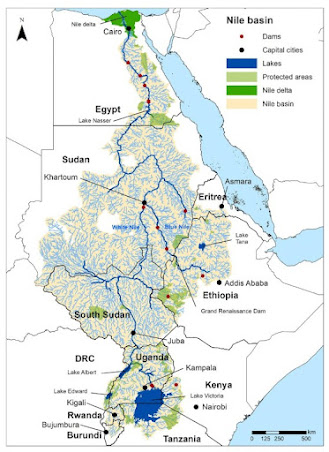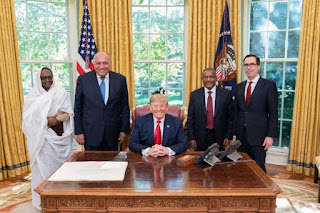The Nile Basin Initiative: an attempt at cooperation
In my second post, I mentioned the Nile Basin Initiative (NBI), a platform for transnational cooperation for the management of the Nile river. In this post, I would like to explore this initiative further, looking at its history, how it works, as well as the challenges it faces.
The NBI, which aims to increase cooperation between the Nile riparian countries, was established in 1999. This intergovernmental collaboration includes 10 nations: Egypt, Sudan, Ethiopia, South Sudan, Kenya, Tanzania, Uganda, Rwanda, Burundi and the DRC, with Eritrea as an observer state. It is an important step for countries looking for more positive interactions and collaboration.
The NBI's main goals include building "an inclusive framework for governing the river's water" (Al-Anani, 2020), as well as focusing on shared interests and "build confidence through cooperation at practical levels" (Küng, 2003). The NBI is focused on facilitating joint, coordinated action and mutual gain. It also acts as a forum where the different countries can exchange knowledge and ideas, as well as negotiate a Cooperative Framework Agreement (CFA) "to set up a permanent, inclusive legal and institutional framework" (Mekonnen, 2010).
The NBI enjoys financial support from major international institutions such as the World Bank. This institution administers the Nile Basin Trust Fund (World Bank, 2019) which aims to provide financial support to the Nile riparian countries.
However, the NBI faces a number of challenges. While it advocates for equality between the Nile Basin nations, the 1929 Nile Basin Treaty keeps the Nile riparian countries in conflict over the region's water, as it gives much more power to Egypt. This treaty requires every country which seeks to use the water of the Nile to obtain permission from Egypt. Egypt's position of power is not sustainable as the developmental needs of the other countries need to be considered. The other riparian countries protesting against Egypt's advantageous position has resulted in Egypt and Sudan refusing to engage in some NBI activities (such as refusing to ratify the CFA). The NBI is therefore in conflict with the 1929 treaty and, if this problem is not dealt with in a diplomatic manner, military interventions and water wars could potentially happen (Belay et al, 2010).
Another issue that has been raised is the participation of the World Bank. The World Bank (and the IMF) is criticised for playing a role in Africa's impoverishment. The institution's policies are blamed for the rise of poverty in the world, particularly in Africa (Dembele, 2005). Therefore, there is doubt on whether achieving the NBI's goals will be possible if the World Bank is involved, given its numerous past failures.
A further weakness of the NBI is the lack of involvement of local indigenous people when planning NBI projects. The incorporation of local indigenous knowledge, which has been used in the Nile River Basin for a very long time, could be very useful for upskilling in the region, which would help achieve one objective of the NBI: eradicating poverty and promoting economic integration (Belay et al, 2010).



Very interesting read on the attempted co-operation of the Nile! Beyond the riparian countries, who would you suggest is the most important stakeholder for sustainable management of the basin?
ReplyDelete